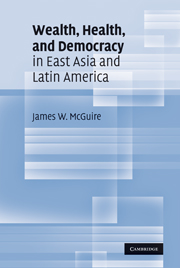Book contents
- Frontmatter
- Contents
- Figures and Tables
- Preface and Acknowledgments
- Abbreviations
- 1 Incomes, Capabilities, and Mortality Decline
- 2 Democracy, Spending, Services, and Survival
- 3 Costa Rica: A Healthy Democracy
- 4 Chile: The Pinochet Paradox
- 5 Argentina: Big Welfare State, Slow Infant Mortality Decline
- 6 Brazil: From Laggard to Leader in Basic Health Service Provision
- 7 Taiwan: From Poor but Healthy to Wealthy and Healthy
- 8 South Korea: Small Welfare State, Fast Infant Mortality Decline
- 9 Thailand: Democratization Speeds Infant Mortality Decline
- 10 Indonesia: Authoritarianism Slows Infant Mortality Decline
- 11 Wealth, Health, Democracy, and Mortality
- Appendix Tables
- Works Cited
- Index
2 - Democracy, Spending, Services, and Survival
Published online by Cambridge University Press: 06 July 2010
- Frontmatter
- Contents
- Figures and Tables
- Preface and Acknowledgments
- Abbreviations
- 1 Incomes, Capabilities, and Mortality Decline
- 2 Democracy, Spending, Services, and Survival
- 3 Costa Rica: A Healthy Democracy
- 4 Chile: The Pinochet Paradox
- 5 Argentina: Big Welfare State, Slow Infant Mortality Decline
- 6 Brazil: From Laggard to Leader in Basic Health Service Provision
- 7 Taiwan: From Poor but Healthy to Wealthy and Healthy
- 8 South Korea: Small Welfare State, Fast Infant Mortality Decline
- 9 Thailand: Democratization Speeds Infant Mortality Decline
- 10 Indonesia: Authoritarianism Slows Infant Mortality Decline
- 11 Wealth, Health, Democracy, and Mortality
- Appendix Tables
- Works Cited
- Index
Summary
This chapter explores associations involving democracy, public health care spending, the provision and utilization of basic social services, and infant mortality. The universe of cases is the 104 developing countries with populations greater than 500,000 in 1990, plus Taiwan. The analysis is cross-sectional; the technique is ordinary least squares multiple regression using the best data available for a large number of developing countries and employing diverse checks for the robustness of the findings. Most of the variables are measured as close to 1990 as the data permit. The main public health finding is that the provision and utilization of basic social services was associated with lower infant mortality, even taking into account a wide range of economic, demographic, geographic, and cultural factors. The main political science finding is that long-term democratic experience, and to a lesser extent short-term democratic practice, was associated with the more widespread provision and utilization of mortality-reducing basic social services.
The political science part of the analysis suggests that political regime form can affect human development not only intrinsically, by directly shaping and constraining our ability to live the lives we have reason to choose, but also instrumentally, by influencing our ability to survive infancy. The public health part of the analysis has implications for decisions about how to try to reduce the infant mortality rate. As the wealthier is healthier conjecture would predict, a one standard deviation rise in GDP per capita is found in the analyses reported below to “reduce” infant mortality, statistically speaking, more than a one standard deviation rise in any of the social service variables.
- Type
- Chapter
- Information
- Publisher: Cambridge University PressPrint publication year: 2010



